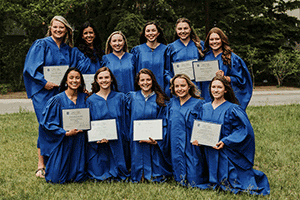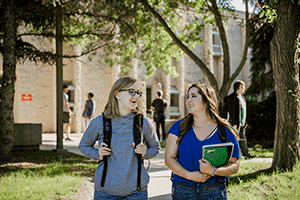Ready to learn more?
Get all the details straight to your inbox!

Living in The Student Village at Luther College, our student residence, comes with a choice of healthy, nutritious meal plans. That means no grocery shopping, no meals to cook, and no dirty dishes to worry about. You can focus on your studies and wellness!

You can book a tour of Luther College, the U of R campus, and our student residence, The Student Village at Luther College, any time throughout the year. Contact our Recruitment Office at 1-306-206-2117.

Every degree program at Luther College offers a study abroad option and an optional experiential learning component where you gain real world experience and get paid while going to school!

Eating better means studying better. The Luther Cafeteria offers fresh, healthy, nutritious meals seven days a week with a self-serve “all-you-care-to-eat” concept students prefer.

Luther College students are U of R students and receive all the same benefits. Upon graduation you will receive a U of R degree.

Luther College offers Bundles programs that group together first-year students and classes to give you a great start and help ease the transition from high school to university.

The priority deadline for academic application is March 15. To book a personalized enrolment counselling appointment, contact our Recruitment Office at 1-306-206-2117.

Luther College is a great choice for high school to university transition. Enjoy all the benefits of a larger campus, without feeling lost in the crowd. Our community is full of caring mentors and peers to ensure a positive student experience.
Get all the details straight to your inbox!
By Bryan Hillis
The editors of this issue provided a quotation from Liz Coleman, President of Bennington College in an address concerning the value and purpose of a liberal arts education.
In truth, liberal arts education no longer exists, at least genuine liberal arts education, in this country. We have professionalized liberal arts to the point where they no longer provide the breadth of application and enhanced capacity for civic engagement that is their signature. Over the past century the expert has dethroned the educated generalist, to become the sole model of intellectual accomplishment.
Coleman then described what the ‘intellectual accomplishment’ of a liberal arts education should be, namely the ‘advancement of the public good’. She argues further that such public good will be advanced only if the educator of the liberal arts engages a more general linking of knowledge, what has become known in university circles as interdisciplinary studies. Certainly the program Coleman describes seems to have a salvatory aspect for providing the liberal arts with a purpose in a world where secondary education has become so much the domain of career advancement, an aspect where liberal arts education is perceived to be lacking. So there is much to be championed in Coleman’s argument and perspective.
However, even Coleman, with her appeal for the usefulness of the liberal arts, has fallen into the trap that liberal arts finds itself today. That trap is to be utilitarian rather than curiosity driven. I will argue in that the pursuit of liberal arts is distinguished more importantly by scholarship, freedom and a recognition that our actions must be tempered by the limitations of what we may come to know.
Coleman’s message is truly inspirational, encouraging us to not to rely on the experts and in fact, as the chosen quote illustrates, to be more general in our pursuit of knowledge. However, the quote misrepresents one of Coleman’s key points regarding the role of experts in liberal arts education. As it stands, it suggests that we should not rely on experts in our pursuit of the advancement of the public good but rely more on the ‘educated generalist’. While Coleman’s “ABC’s of anthropology” may indicate a contempt for specialized knowledge, the main point she is making with that illustration is that we can get so hung up in the details of a discipline that we fail to make connections and ultimately those connections must advance the public good. The reason Coleman decries the scholarly expert is that too often, the scholarly endeavour ends there. The generalist is needed to bring that discussion to the public forum for “the advancement of the public good”, Coleman argues.
There is much truth in Coleman’s message but there are inherent dangers. Coleman’s is a rather utilitarian view of the liberal arts that smacks of nation building with words like ‘public policy’, ‘common good’ and ‘civic engagement’ dominating. I doubt Coleman actually meant this. However, I do worry that, in the same way it is wrong to consider a liberal arts degree as a means of ensuring a better pay cheque when one graduates, it is just as wrong to consider a liberal arts education as the great hope of ‘advancing the public good'. Allow me to explain.
Certainly, a liberal arts degree does mean greater earning power when one graduates as study after study indicates but that is not the reason to pursue such a degree. It is just as erroneous to think that the reason more people should have a liberal arts education is that the public good will necessarily be advanced. It is obvious that this is probably the case, but that is not the reason to pursue a liberal arts education nor is it at the essence of a liberal arts education. What Coleman did not say is that a liberal arts education is curiosity driven, not to advance the public good, something which Coleman assumes is well established. In our North American context, and more precisely, in Coleman’s American context, words like democracy, public policy and civic mindedness are assumed to be goods we must pursue. In fact, a liberal arts education strives to question even these goods, not necessarily pursuing what kind of world we should and would and can be making but what kind of world it is. Curiosity is at the heart of a liberal arts education; even Coleman’s agenda, as praiseworthy as it is, should not drive the liberal arts. If her agenda does drive the liberal arts agenda, there is every reason to fear that liberal education will devolve into propaganda of the worst kind, as Coleman’s personal story of Soviet educators seeking a liberal arts education implies.
Don Markwell, professor of international relations, public policy and political science at Oxford University and current warden of Rhodes House, recently gave a lecture at Trent University, Ontario (Feb. 9, 2010) entitled “On Liberal Education” in which he maps out the correct order of understanding for a liberal arts education. At the core, a liberal education will contain an emphasis on intellectual and personal breadth, including a curiosity-driven learning regarding human experience in all its diversity. Through such learning, key intellectual skills such as the capacity to think for oneself, to express oneself clearly and to interpret the nuances of words and context will be acquired. Markwell then says something very close to Coleman, namely that a liberal education will encourage one to be an active citizen in society, having considered carefully one’s values and beliefs. Such critical reflection is intrinsic to the liberal education, even as such an education moves from the inwardly digested to the outwardly connected. To be clear, Markwell and Coleman end at the same place but what is different is that Coleman seems to assume that the liberally educated person knows where one is headed, in the best of American civically minded educational traditions. Markwell assumes that we will be a better society as a result of a liberal arts education but not that the agenda for that education or the better society has already been pre-determined.
In fact, a liberal education is distinguished by scholarly searching which may be dependent on the expert but which must also generalize. More importantly, academic freedom is at the heart of a liberal education; the freedom to pursue the truth in whatever area of engagement one finds oneself is a critical component. No master, even one as noble as the advancement of the public good, must be served by liberal arts education.
A foundational item overlooked by Coleman and Markwell here is a disposition of humility; that is, failing to understand that the best scholarship of today, whether that scholarship is narrowly defined or connected in the most interdisciplinary way, may be eclipsed by new insights, new experiences and new data. Failure to include such humility in a liberal arts education will result in fundamentalism, whether that be a fundamentalism of religion, public policy or the advancement of the common good. As inspirational as Coleman is and as much as I applaud many of her sentiments, this aspect of humility must underlie the pursuit of a liberal education.